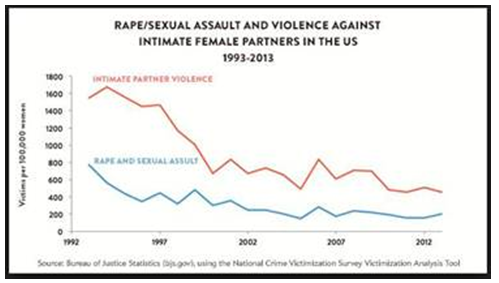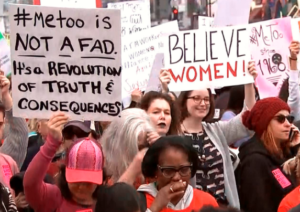Gender Warriors Play On Popular Passions in Quest for Mob Justice
SUCCESS! On May 6, 2020, the Department of Education released its new Title IX regulation. The regulation, which will support both complainants and the accused, take effect on August 14, 2020.
+++++++++++++++++++++++++++++++
At several points in our nation’s history, notions of due process have been overcome by mob rule: the Salem Witch Trials, ‘Jim Crow’ lynch mobs, Satanic ritual child sex abuse cases of the 1980s, and the national hysteria that followed the gang-rape allegations of Jackie Coakley at the University of Virginia.
Once again we need to ask, Are we entering another era of mob justice?
The current moral panic is centered on the issues of sexual assault and domestic violence. The Department of Justice reports that domestic violence against women (orange line) and sexual assault (blue line) have fallen dramatically since 1992:

But mobs are motivated by outrage and ideology, not by thoughtful analysis of crime patterns. Indeed, these persons believe in the existence of “rape culture,” even though the notion of “rape culture” has been widely ridiculed and discredited.
Eight signs point to a growing moral panic in the United States:
- #MeToo: Originally intended to highlight the problem of workplace sexual harassment, the movement has been criticized by media personalities and other commentators. Seeking to reverse the trend, #MeToo founder Tanya Burke is trying to bring the movement back to its original purpose: “We have to shift the narrative that it’s a gender war, that it’s anti-male, that it’s men against women.”
 #BelieveWomen: An outgrowth of #MeToo, this movement refers to the perceived necessity to accept women’s allegations of sexual harassment or domestic violence without question or doubt. Under this approach, a presumption of guilt overrides the presumption of innocence.
#BelieveWomen: An outgrowth of #MeToo, this movement refers to the perceived necessity to accept women’s allegations of sexual harassment or domestic violence without question or doubt. Under this approach, a presumption of guilt overrides the presumption of innocence.- Start By Believing: In the past, police detectives were expected to conduct investigations that were objective and fair. But now the federally funded “Start By Believing” program is training law enforcement officials to end neutral fact-finding, and instead “Start By Believing.” In early 2018 the Center for Prosecutor Integrity filed a 7-page complaint with the Department of Justice. The DOJ has yet to provide a substantive response.
- Presumption of Guilt: Law professor Cheryl Hanna has noted that “evidentiary standards for proving abuse have been so relaxed that any man who stands accused [of domestic violence] is
considered guilty.” In courts of law, the complainant is often referred to as the “victim,” even before an adjudication has been reached. The Start By Believing campaign is an example of the trend to create a presumption of guilt. - Everyone a Victim or Perpetrator: The federal Violence Against Women Act is up for reauthorization in 2019. Rep. Sheila Jackson Lee has proposed a bill with such sweeping definitions that virtually all Americans would become perpetrators or victims of domestic violence. “The object is to maximize the appearance of victimization of females by males,” according to one commentator.
 6. False Allegations: American is experiencing an epidemic of false allegations. Nearly one in 10 persons report they have been falsely accused of domestic violence, sexual assault, or child abuse. And thousands of persons have signed a petition to “Stop False Allegations of Domestic Violence.”
6. False Allegations: American is experiencing an epidemic of false allegations. Nearly one in 10 persons report they have been falsely accused of domestic violence, sexual assault, or child abuse. And thousands of persons have signed a petition to “Stop False Allegations of Domestic Violence.”
7. Affirmative Consent: Even though the legal standard is “welcomeness,” the affirmative consent movement seeks to change that to require that explicit consent be given on a continuing basis for each sexual action. But proponents do not specify what “explicit” or “continuing” means, opening the door for a woman to withdraw her consent days or even months after the sexual encounter took place. Affirmative consent policies are now in place on most college campuses: http://affirmativeconsent.com/consentpolicy/
8. Campus Due Process: In 2011 the Obama Administration issued a policy that mandated all campus sexual assaults be handled by poorly equipped disciplinary committees and eliminated key due process protections such as cross-examination. The new approach gave rise to hundreds of complaints and lawsuits by both alleged victims and accused students. On November 29, 2018 the Department of Education released proposed regulations designed to restore due process on campus.
Eliminating the presumption of innocence, biasing investigations in favor of the accuser, turning everyone into a victim or perpetrator, a spate of false allegations, affirmative consent, and the repudiation of due process on campus. These are the worrisome signs of mob justice in America.
